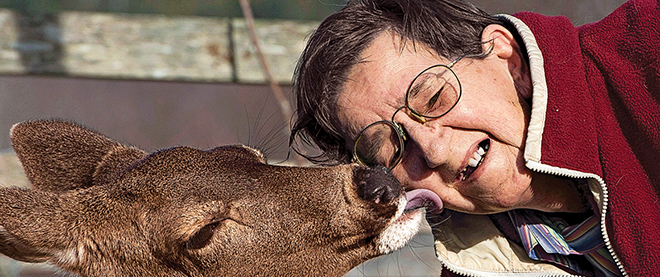Good News, Bad News
Housing prices, Neanderthal babies and a deer named Bimbo
Tim Mueller/The New York Times/Redux
Share

GOOD NEWS
Berry happy new year
Shares in Research In Motion, the sick man of Canadian tech, have rallied 46 per cent, to above $17, since New Year’s Eve. The phone maker, which has hemorrhaged market share to Apple and Android, is earning early raves for its new BlackBerry 10 operating system and for Thorsten Heins’s revamped management regime. Analysts think the odds may still be against RIM, but it does have 80 million subscribers and remains strong among institutional customers in need of high-grade phone security.
Deer prudence
Vancouver Island officials announced they will let 70-year-old Ucluelet-area eccentric Janet Schwartz keep her “child”—a house-trained 10-year-old doe named Bimbo. Wildlife officers had arrived at Schwartz’s isolated shack to declare that she was no longer allowed to keep Bimbo tethered in the yard, but an international outcry convinced the government that it was irrational to “free” an animal that has slept next to Schwartz since birth. “The wolves would have it in no time,” relieved local vet Jane Hunt told the National Post.
Busy Bs of deregulation
The Canadian Federation of Independent Business issued an encouraging 2013 edition of its annual “Red Tape Report Card,” upgrading the federal government from B minus to B plus as its Red Tape Reduction Action Plan swings into motion. Ottawa is now officially following a “one-for-one rule” whereby any new regulation requires at least one existing regulation of equal onerousness to be eliminated. The CFIB bumped both Ontario and Quebec from B minus to B; Ontario was praised for its even tougher “two-for-one rule,” and Quebec leads the way in measuring and reporting regulatory costs.
Bouncing baby Thag
Harvard geneticist George Church told a relieved world that despite hundreds of headlines to the contrary, he is not looking for an “adventurous woman” to bear a cloned Neanderthal baby. Church told the Boston Herald that a translation foul-up by Der Spiegel had left him looking like a half-mad Dr. Moreau. “I’m certainly not advocating” the creation of a cave baby, Church said, but added that “if it is technically possible someday, we need to start talking about it.”
BAD NEWS
Tighter belts ahead
Albertans were warned by Finance Minister Doug Horner to brace for a cut-laden March budget. Alberta’s oil and bitumen revenues continue to be bedevilled by growing supplies of tight oil in the U.S. Midwest, with the benchmark Western Canada Select crude selling for record-high discounts against comparable products elsewhere. “This is not going to be a fun budget,” warned Horner. He promised no new taxes, but calls from experts for a retail sales tax are gaining volume.
Taken to the cleaners
Retired baseball pitcher Curt Schilling is being forced to sell the famous “bloody sock” he wore while pitching for the Red Sox in the 2004 World Series. Schilling founded a video game company in 2008 and moved it to Rhode Island in 2010 after receiving a $75-million loan from the state’s economic development board. But 38 Studios went bust last summer, and Schilling must sell his most recognizable piece of personal memorabilia. His ankle bled openly throughout the ’04 post season after he received an experimental surgery now called the “Schilling procedure.”
Blurry benefits
A University of Sydney study has found a worrisome link between regular Aspirin use and neovascular or “wet” AMD, a degenerative disease of the eye that usually affects people over 50. The health benefits of daily Aspirin are so large that doctors are far from abandoning it, but the incidence of wet AMD in a 2,389-patient Australian cohort tracked over 15 years was about three times higher among Aspirin users, irrespective of other risk factors, and the trend was stronger at higher doses. Aspirin use was uncorrelated with the much more common “dry” form of the illness.
Measuring the bubble
Despite a downturn in the market, Vancouver still has the second-least affordable housing among the world’s major cities, reports the U.S. think tank Demographia. The median house price in Vancouver is 9.5 times the median household income in the city, a figure exceeded only by Hong Kong’s 13.5. For Canada as a whole, Demographia estimates the current “median multiple” at 3.6. The consultancy also rates Toronto, with a multiple of 5.9, as “severely unaffordable.”